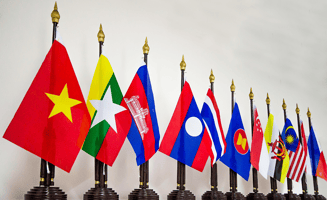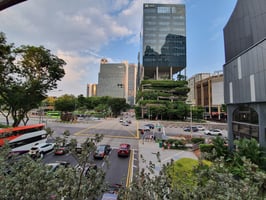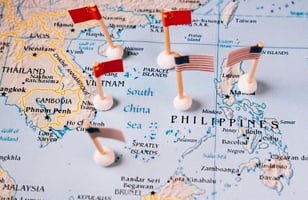Marcos Jr.’s rise is grounds for outrage — but hold the shock It’s troubling enough another Marcos...
Kusu News 31-May-2022
Biden, on inaugural Asia visit, says he would be willing to use force to defend Taiwan
23-May-2022 Reuters
TOKYO, May 23 (Reuters) - U.S. President Joe Biden said on Monday he would be willing to use force to defend Taiwan, capping a series of critical comments about China while in Asia that an aide said represented no change in U.S. policy toward the self-ruled island.
Biden's remarks, made during his first visit to Japan since taking office, and as Japanese Prime Minister Fumio Kishida looked on, appeared to be a departure from existing U.S. policy of so-called strategic ambiguity on Taiwan.
China considers the democratic island its territory, under its "one China" policy, and says it is the most sensitive and important issue in its relationship with Washington.
When a reporter asked Biden during a joint news conference with the Japanese leader if the United States would defend Taiwan if it were attacked, the president answered: "Yes".
"That's the commitment we made," he said.
"We agree with a one-China policy. We've signed on to it and all the intended agreements made from there. But the idea that, that it can be taken by force, just taken by force, is just not, is just not appropriate."
Opportunities arising from Middle East’s Asian pivot
23-May-2022 The Business Times
The Middle East has always been considered an energy exporter to Asean, but this relationship has become more nuanced in recent years, especially as the former has shifted its focus to boosting non-oil exports.
Notably, countries such as Indonesia and Singapore have benefited.
Late last year, the Indonesian government announced they had secured US$32.7 billion worth of investment commitments from United Arab Emirates (UAE) businesses in various sectors, such as vaccine manufacturing and distribution.
“Indonesia is a very typical case of how I think Asean is becoming a magnet for foreign direct investment (FDI) from the Gulf countries,” said Gyorgy Busztin, a visiting research professor at the Middle East Institute, National University of Singapore.
Dr Busztin cited Asean’s political stability (outside of Myanmar) as well as a general lack of labour unrest as key factors that draw these Gulf countries to the region, even as he qualified that these countries have to be looked on a case-by-case basis.
“Compatibility, stability, and predictability, which are, of course, combined with the presence of a large, young, and highly trained workforce - it all comes together very nicely.”
Singapore too has benefited from the relationship.
US President Biden formally unveils Indo-Pacific Economic Framework
23-May-2022 The Straits Times
TOKYO (AFP) - President Joe Biden launched a new Asia-Pacific trade initiative on Monday (May 23) in Tokyo, with 13 countries including India and Japan signing up, although questions about the pact's effectiveness remain.
Biden formally unveiled the Indo-Pacific Economic Framework for Prosperity, or IPEF, on his second day in Japan, where he is also held talks with Prime Minister Fumio Kishida before joining a regional Quad summit on Tuesday.
“I believe we’ll win the competition of the 21st century together,” he said at the launch, attended in person by Kishida and Indian Prime Minister Narendra Modi, and virtually by representatives from the other countries.
"This framework is a commitment to working with our close friends and partners in the region on challenges that matter most to ensuring economic competitiveness in the 21st century," he said.
Unlike traditional trade blocs, there is no plan for IPEF members to negotiate tariffs and ease market access - a tool that has become increasingly unpalatable to US voters fearful of seeing homegrown manufacturing undermined.
Instead, the programme foresees integrating partners through agreed standards in four main areas: the digital economy, supply chains, clean energy infrastructure and anti-corruption measures.
Biden’s Real Taiwan Mistake
The big blunder is not including the island democracy in the new Indo-Pacific economic framework.
23-May-2022 WSJ
The press is saying President Biden blundered Monday in committing the U.S. to defend Taiwan, but after three similar statements in the last year maybe he means it. The arguably much bigger mistake is his decision not to include Taiwan in the new Indo-Pacific Economic Framework that the Administration launched on Monday.
Asked by a reporter if the U.S. would defend Taiwan militarily against China, Mr. Biden answered with a blunt “yes.” He went on to say that, “We agree with the One China policy. We signed onto it and all the attendant agreements made from there. But the idea that it could be taken by force, just taken by force, is just not—it’s just not appropriate. It will dislocate the entire region and be another action similar to what happened in Ukraine.”
That wasn’t a model of clarity, but it sounded like a change in policy from the “strategic ambiguity” toward the defense of Taiwan that has long been U.S. policy. Under the 1979 Taiwan Relations Act, Washington committed to arming the island democracy to defend itself but was unclear about whether the American forces would join the fight.
Asean growth expected to surpass China in 2022: analysts
25-May-2022 The Business Times
THE extreme polarity in Asean’s and China’s approach to Covid-19 is making its impact felt, with economists projecting that 2022 could be the first time in 30 years that gross domestic product (GDP) growth of the Asean-6 outpaces China.
Maybank analysts say they expect Asean-6’s GDP to grow at 4.9 per cent in 2022, faster than China’s 4.5 per cent. Dropping Singapore, which is further along in terms of post-Covid recovery, they expect Asean-5 growth for 2022 to come in at 5.2 per cent.
The Asean-5 region comprises Indonesia, Malaysia, the Philippines, Thailand, and Vietnam.
“Asean is adopting a ‘living with Covid’ strategy in a new endemic normal, as opposed to China’s ‘zero-Covid’ strategy,” said the analysts, noting that as a result, mobility indices have largely returned to pre-pandemic levels across Asean and that visitor arrivals are surging from their lows, even as they remain well below pre-pandemic levels.
China and Hong Kong, meanwhile, are still imposing strict lockdowns and maintaining tight borders.
“There is no clarity and timeline on when China will shift away from its zero-Covid policy,” Maybank analysts Chua Hak Bin, Lee Ju Ye, Brian Lee and Luong Thu Huong said.
Taiwan Raids Chinese Firms in Latest Crackdown on Chip Engineer-Poaching
26-May-2022 US News
TAIPEI (Reuters) - Taiwan authorities raided ten Chinese companies suspected of illegally poaching chip engineers and other tech talent this week, the island's Investigation Bureau said on Thursday, the latest crackdown on Chinese firms to protect its chip supremacy.
Home to chipmaker giant TSMC and accounting for the majority of the world's most advanced semiconductor manufacturing capacity, Taiwan has ramped up a campaign to counter illegal poaching by Chinese companies in what the island sees as a threat to its chip expertise.
The bureau said it raided 10 Chinese companies or their R&D centers which operate in Taiwan without approval earlier this week. It said nearly 70 people have been summoned for questioning in a joint crackdown across several cities including the capital Taipei and the island's semiconductor hub, Hsinchu.
"The illegal poaching of Taiwan's high-tech talent by Chinese companies has badly impacted our international competitiveness and endangered our national security," the bureau said in a statement.
Airbnb to quit China as lockdowns restrict tourism
26-May-2022 BBC
Airbnb is shutting down its domestic rentals in China, where a "zero-Covid" policy has meant lockdowns are ongoing.
All listings for homes and experiences in the country will be removed from the company's website by summer, a source familiar with the matter told the BBC.
Stays within China made up only 1% of Airbnb's revenue over the last few years.
The company is expected to instead focus on Chinese residents travelling abroad to other destinations.
Before the pandemic, Chinese travellers heading abroad had tripled in less than a decade, reaching 155 million journeys in 2019, according to the United Nations World Tourism Organisation.
But since 2020, China has had some of the toughest Covid restrictions in the world, making travel into and around the country extremely difficult.
All eyes on the Philippines’ new economics team to steer recovery post-pandemic
31-May-2022 The Business Times
Ferdinand Marcos Jr, the President-elect of the Philippines, has started to name some members of his new administration, with the inclusion of several appointments to economic portfolios who will play key roles in steering the economy in the post-pandemic environment and beyond.
As of Monday (May 30), at least 17 names have been officially announced to head executive departments and other Cabinet-level agencies.
All eyes are on a trio of former professors from the School of Economics at the University of the Philippines. Set to take the helm of the Department of Finance is current Bangko Sentral ng Pilipnas (BSP) governor Benjamin Diokno, a 74-year-old economist who has led the central bank since 2019.
Felipe Medalla, a long-time BSP board member, will take over as the central bank’s governor. Arsenio Balisacan, the former chief of the National Economic Development Authority during the Benigno Aquino administration, has been picked to return to his old post.
-1.jpg?width=146&height=50&name=Kusu%20(1)-1.jpg)



